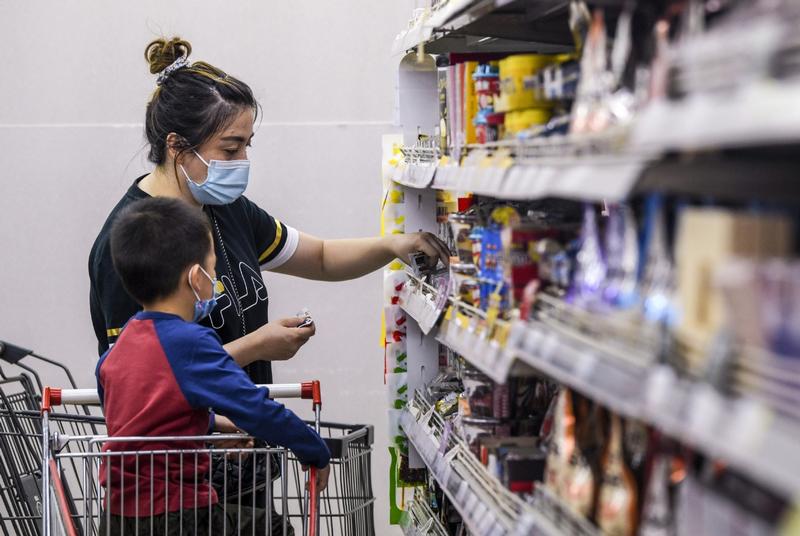 In this Sept 2, 2020 file photo, residents buy food and supplies at a supermarket in Urumqi, Northwest China's Xinjiang Uygur autonomous region. (PHOTO / XINHUA)
In this Sept 2, 2020 file photo, residents buy food and supplies at a supermarket in Urumqi, Northwest China's Xinjiang Uygur autonomous region. (PHOTO / XINHUA)
Trusted brands, particularly those producing foods and hygiene-related goods, have emerged from the COVID-19 pandemic stronger than before as the top 22 fast-moving consumer goods (FMCG) companies in China added 82 million more consumers compared to last year, according to an industry survey.
Despite challenges with COVID-19, 19 out of the top 22 companies in China grew their shopper base, demonstrating there are ample growth opportunities for even the biggest players.
Jason Yu, general manager of Kantar Worldpanel Greater China
Kantar Worldpanel said the 22 FMCG companies attracted over 100 million urban Chinese households during the 12 months ended Oct 9, with dairy producers Yili, Mengniu and P&G each attracting more than 160 million families.
Yili, which rose to the top spot for the first time, was chosen by 92.2 percent of families in urban China.
In terms of growth rates, meat-based food brand Shuanghui, seasoning play Haday, snack giant PepsiCo, instant noodle giant Master Kong and oil and foodgrain brand Wilmar are the top five performers, posting the fastest gains in consumer numbers compared with their peers.
"Despite challenges with COVID-19, 19 out of the top 22 companies in China grew their shopper base, demonstrating there are ample growth opportunities for even the biggest players," said Jason Yu, general manager of Kantar Worldpanel Greater China.
"The disruption caused by the pandemic has impacted different sectors, yet successful players have managed to respond rapidly to changes in consumption needs and shopping behavior," Yu said.
ALSO READ: FMCG sector set to enter recovery phase
COVID-19, the most unexpected factor in 2020, transformed the FMCG market dramatically, said the report.
Dairy players, such as Yili and Mengniu, have gained more consumers because their products are well placed to take advantage of the increased importance people place on health and immunity. Yili has rolled out sugar-free Greek-style yogurt and plant-based milk, with both growing 500 percent year-on-year during the "Double Eleven "shopping event.
With restrictions on travel and more time spent at home, consumers in China increasingly enjoy home cooking. This has enabled seasoning and cooking aid category leaders like Haday and Wilmar to experience faster growth.
Foshan Haitian Flavoring and Food Co Ltd, which produces Haday soy sauce, saw its market value surge to over 520 billion yuan (US$79.3 billion) on Wednesday in Shanghai thanks to robust demand for home-cooked products.
Driven by a desire to fill up pantries and embrace convenience, Shuanghui, Master Kong and Uni-President grew their customer base through packaged sausages, other meats and instant noodles.
READ MORE: Robust demand for imported goods buoys overseas FMCG companies
On the nonfood side, hygiene-conscious consumers are buying more cleaning-related products such as hand soap and antibacterial wipes to protect them from infection. This trend also helped boost buyers of P&G, Unilever and Hengan products.
As visits to offline stores fell following the coronavirus outbreak, 41 percent of Chinese families ordered FMCG through delivery platforms and retailers' own apps and mini-programs. Despite the decrease in penetration in the third quarter, online-to-offline (O2O) deliveries still attracted 31 percent of families in China.
O2O is a strategy that draws potential customers from online channels to make purchases in physical stores.
O2O delivery has played a critical role in recouping lost traffic to offline stores and tapping into the new growth "moment". All major players have been rallying to work with retailers to build their presence over the last 12 months, with Yili, Mengniu and P&G leading the pack.
READ MORE: Chinese digital economy gets big, 'fresh' boost
Kantar Worldpanel reveals that leading players can only sustain growth through wider and deeper e-commerce deployment. Yet there are still opportunities for expansion in the brick-and-mortar world.


